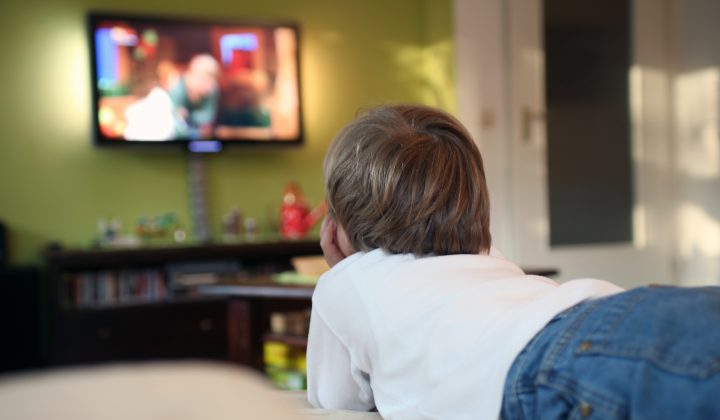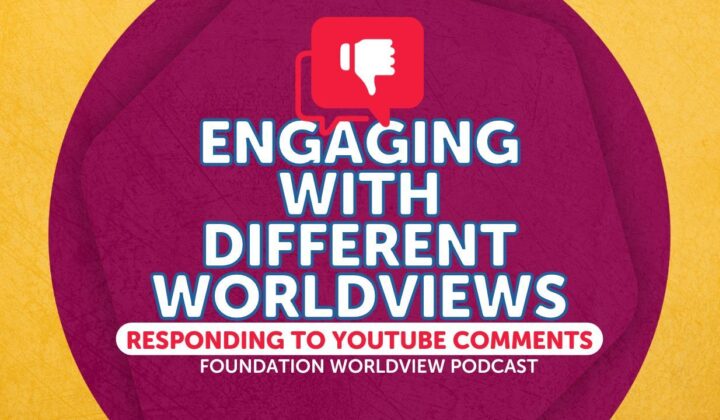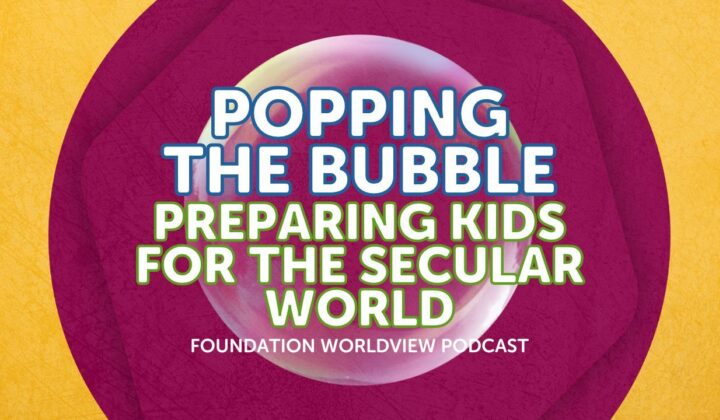Learn more about the journey that led to us equipping kids to carefully evaluate every idea they encounter.
Meet members of our team who have contributed to curriculum development.
Hear from real users of the Foundation Curriculum.
Learn what we believe about God, Jesus, Scripture, and more.
Non-Christian Playdates?
In this episode, we tackle a listener's question on play dates at non-Christian homes and concerns about worldly exposure. We discuss balancing exposure with wisdom, the importance of biblical hospitality, and how to ground children in the biblical worldview. Join us for practical advice on navigating these situations with faith and discernment.
Transcript
Note: The following is an auto-transcript of the podcast recording.
Hello, friends. Today's question says, what do you think about play dates at non-Christian friends homes? I'm concerned about worldly exposure. I don't want to insulate my kids, but I also don't want to send them into it. Really interesting question. I think it's one that a lot of people think through because we know that we're in the world and many people in the world do not know Jesus. Either they have not yet met Jesus, they've not yet been reconciled to him or they may never be. And we as Christians are called to be in the world, but not of it. And this is what we want to model for our children. But how do we do that?
That's the question we're going to dive down deep into today on the Foundation Worldview podcast. And my name is Elizabeth Urbanowicz. I'm the host of this podcast, and our goal here at the Foundation Worldview Podcast is to answer your questions so that you can equip the children that God has placed in your care to carefully evaluate every idea they encounter and understand the truth of the biblical worldview.
Now, how I'm going to start off answering this question is with a question that I'm sure most of you who are faithful listeners already know, and that question is, what is the goal? Okay, so what is the goal of thinking through having our kids either have play dates or not have play dates at the home of someone who is not a Christian? And I think this question or already answered this question of what the goal is that the goal is to let kids be exposed to the world without placing them in unwise situations because we know it's a very unwise idea to just completely shelter our children from any exposure to the world because if we do that, we're not actually preparing them to live in the world. While it's also really unwise to just shove them out into the world with any guidance, I like to think of it as exposure to germs. We want our kids to be exposed to germs in small doses so that their bodies have the opportunity, their immune systems can actually recognize what that germ is and fight back against it. And so we don't want to just completely isolate them from all germs. We want them to be exposed so that their bodies learn how to fight such viruses and bacteria and their immune systems can be strengthened. Well, at the same time, we're not going to send our children often to a tuberculosis ward in some hospital. That would just be very unwise. And so when we're thinking about worldly exposure, specifically as it regards to play dates, what is wise and what is not wise?
Before we answer this question, we just ask that you invest the two seconds that it takes to rate and review this content. Doing so really helps us just reach more Christian adults with the skills that they need to get their kids thinking carefully through every idea they encounter. Also, if you have a question that you would like for me to answer on a future Foundation Worldview podcast, you can submit that question by going to FoundationWorldview.com/podcast. Sorry. So that word forward kind of word there.
So as we think through this question, should we have play dates with non-Christians? Should we not have play dates with non-Christians? I'm going to give you my opinion on this. I would really encourage the questioner and anyone else who's considering this to get wisdom from those at your church for navigating specific situations because I'm going to give some just general overarching wisdom. However, every child, every family is unique. So you're going to need some specific wisdom for your specific situation. And so that's where God has given us the church, his body and your local church is going to know you. They're going to know your community. They're going to know your child way better than I ever could just from reading your three sentence questions. So that would be my advice. I'm going to give you some general wisdom, but really dive down deep into the wisdom of those in your local church.
So in my opinion, I think it is unwise for us to send our children out into the world alone, especially with all that they could be exposed to. Now, if we were talking about this 30, 40 years ago, I still don't know how wise it is to just let our children go over to the houses of non-believers, especially if we don't know them well. However, 30, 40 years ago, anything our children were going to be exposed to that was potentially harmful, was probably going to come in the form of on the tv, which usually was centrally located in an area where everyone was. Where nowadays, because screens are just so readily accessible, the chances of our child getting exposed to pornography or something else at someone else's house are just so high because screens are everywhere they can be viewed at any place. So I think it's unwise to just send our children out into the world alone. But what I do think is wise is purposefully inviting others into our home. We don't want to completely isolate our children from the world. We don't want them to think that everybody who's a non-Christian is bad because here's biblical news: we are all bad. We are all sinners. We all come at equal footing to the cross of Jesus Christ, that we have rebelled against God. We've inherited Adam's sin, and we have chosen to sin every day. So therefore, we are all in need of repentance. We are all in need of God's grace through Jesus. And because of God's common grace, there can be some people who are non-Christians who are very, very nice people because of God's common grace. And so we don't want to just paint this picture for our kids that anybody who doesn't know love and trust Jesus is just the worst possible sinner that they could be. There are some very nice non-Christians out there. So I highly recommend that we open up our home to the world. Now, not just inviting anybody in off the street, not having no boundaries, I think it's important to still set boundaries, but we can practice biblical hospitality and have other families from our neighborhood over to get to know them. This is a way that we can actually get to know the whole family. Who is this family? What do they value? What are their likes? What are their habits? What are their needs and desires? And to know, does this family actually know the gospel or do they not? And so opening up our home is a great thing.
Highly recommend you check out a webinar I did several years ago with Rosaria Butterfield called Raising Kids in a Home that Practices Biblical Hospitality. And in that webinar, we just talk a little bit more about what hospitality looks like. Also, some of the wise boundaries. I think it's always a wise boundary to just tell our kids no one except for family members is going to be in a bedroom. And so just to make the bedrooms off limit, if our kids are going to play, they're going to play in the family room or in the living room or in the kitchen, wherever, just so that it's in a public place.
Another great way to build relationships with non-believers is just plan outings together. You're probably going to go to the park at some time, invite your neighbors from across the street or invite families from your child's school to go to the park together or to go to the zoo or the pool. I know a family in my small group at church, they go to a trampoline park. They have a monthly pass to a trampoline park, and they meet there once a week with other families. And so just plan outings together to get to know the entire family. And so I think this is a much wiser way to let our children get to build relationships with non-believers by doing things together as a family rather than sending them out alone into the home of a stranger.
Now, something else that I think is really important is that we need to train our children to think well and to love others intentionally so that they are prepared for interactions with non-believers. So those of you who have followed the Foundation Worldview ministry for a while, you know that this is what we are all about, grounding kids in the biblical worldview in Scripture and equipping them to think critically and biblically about every idea they encounter. So it's really important that we are immersing our kids in Scripture, that we're reading Scripture with them every day, that we're teaching them the skills that they need to soundly read, interpret, and apply Scripture. We also need to be grounding them in the biblical worldview, understanding. How does Scripture answer big questions such as, who am I? How did we get here? How can we tell right from wrong? Questions like that.
This is exactly what we do in both our Biblical Worldview curriculum and Comparative Worldview curriculum at Foundation Worldview. Those are 25 to 30 lesson curriculums that are video-based. The goal is that you sit alongside your child and go through these lessons with them to be the foundation for everything else they're viewing in life. We also want to help start conversations in everyday life so that they're thinking biblically through their interactions with one another. So highly recommend if you haven't yet, you check out our Biblical Worldview and Comparative Worldview curriculums to go through with your kids just to be the foundation for understanding all of life through the lens of Scripture, and then having conversations about what they encounter. So then when you're out with another family, maybe a mom makes a comment of something didn't go their way and she just said, oh, just the universe determined that this wasn't bound to happen. And then you can have a conversation with your child later and say, okay, when you heard Mrs. So-and-so say the universe determined that this wasn't meant to happen. Does that come from the biblical worldview or does that come from another worldview? And how do you know? And for those of you listening or watching whose children have gone through Foundation's Comparative Worldview curriculum, you know that your children would be prepared to say, oh, that actually comes more from the new spirituality worldview. That's viewing everything as being connected and viewing the viewing, sorry, viewing the universe as some force that actually has control over our lives. And so you can have these everyday conversations.
Then we can practice modeling for our kids. What does it look like for us to love others and to ask good questions to help others think through the truth? We want to model for our kids how to interact well with those from other worldviews. This is something I've mentioned before, and I already mentioned Rosaria Butterfield on this podcast, but this is something that I so appreciate about her family that every time I've stayed with her family every night at dinner, sometimes it's just family dinner. And other times they have people over and they frequently have people over, and it's frequently people from their neighborhood, people from other worldviews, and her children are just used to hearing their parents converse with those from other worldviews. And her children are very well-grounded in the biblical worldview. And part of that is because they have been exposed to so many different worldviews around the dining room table and have watched their parents interact in both truth and love. And this is what we want for our children.
Now, as I mentioned before, every situation is unique. So what you should actually do with your children specific to who they are and the specific neighbors that you have and friends that they have, whether it's from a public school or just from the neighborhood in general, that requires discernment. There might be situations where it's really wise for you to develop close relationships with certain people, and then there's other situations where it might be wise for you not to develop close relationships with those people and have your children around. So it really just requires situation by situation discernment. So again, want to encourage you to talk to those at your local church who know you, who know your children, who will hopefully know your neighbors and some of the people that you're interacting with.
Well, that's a wrap for this episode. But as always, my prayer for you as you leave this time together is that no matter the situation in which you and the children God has placed in your care, find yourselves that you would trust that God is working all things together for your good. By using all things to conform you more into the image of His Son. I'll see you next time.
Related Posts and insights

Why Do Our Children Need Comparative Worldview Education?
In a previous post, we discussed what comparative worldview education is. This post will focus on why our children need comparative worldview education, and how it can address situations like the one I encountered in my classroom.

Engaging with Different Worldviews
In this episode, Elizabeth Urbanowicz responds to comments from a previous episode on talking to children about dinosaurs. She addresses the pushback received from those with different worldviews. Elizabeth then models how to ask good questions when encountering false claims that go against Christianity.

Popping the Bubble: Preparing Kids for the Secular World
Today's question says, "I have three kids, ages five, seven, and one. My husband and I feel strongly that we want our children to have a Christian education, private school, or homeschooling. However, I don't want the real world to hit them like a ton of bricks when they graduate high school and leave the Christian school bubble. You have given some great ideas on other podcasts about analyzing movies, shows, and music from a biblical worldview, but I was curious if you had any other age-appropriate practical ways to expose our children to the secular world as they grow without destroying their innocence?"





